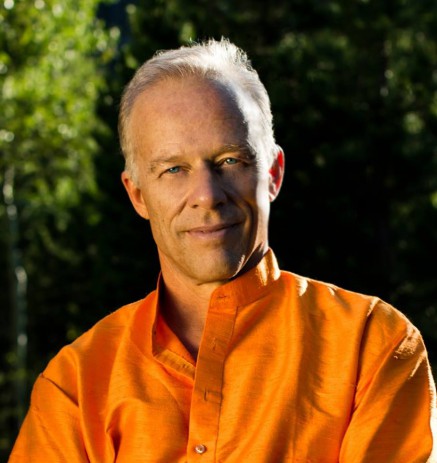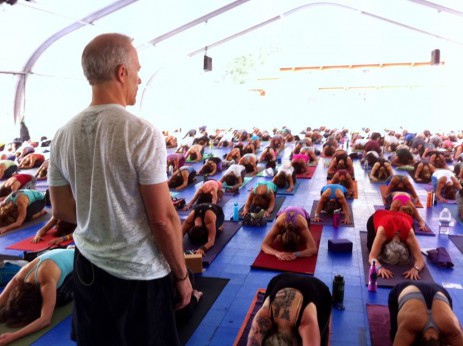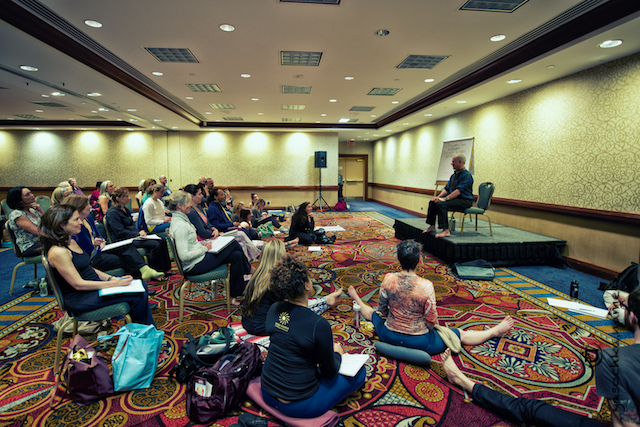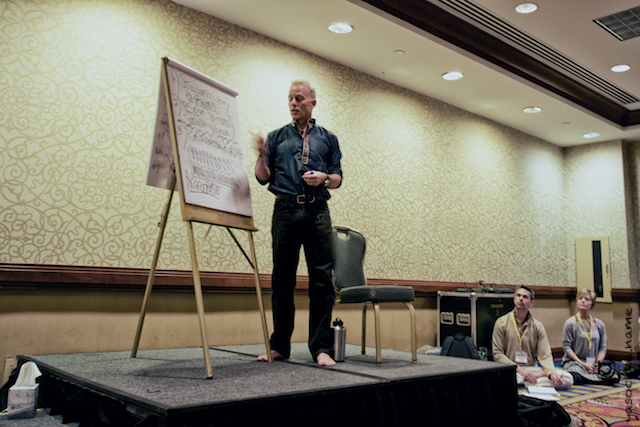Home
/
Articles
/
#8 October 2014
/
Interview with Rod Stryker: "It Is Easier When You Have No Teacher. It Is More Difficult to Have One"
Interview with Rod Stryker: "It Is Easier When You Have No Teacher. It Is More Difficult to Have One"

Rod Strykeris a founder of ParaYoga, is widely considered to be one of the preeminent yoga and meditation teachers in the United States. In this interview Rod is telling about his understanding of yoga, about trends in development of modern yoga and their roots, he is also answering many more interesting questions.
Rod is the author of The Four Desires: Creating a Life of Purpose, Happiness, Prosperity and Freedom.
Rod's study of Yoga began at the age 19. Now he owns two yoga studious in LA. He is on the advisory boards of the Kripalu Institute for Extraordinary Living, the Give Back Yoga Foundation and Yoga International magazine. He serves on the Board of Directors of the Himalayan Institute.
Interview with Rod Stryker

Interview by Olga Sydorenko
Questions by Ilya Zhuravlev and Olga Sydorenko
Would you please tell our readers a bit about yourself?
Well, first of all I am a father. I have got four kids and a wonderful wife. Talking about yoga, it was always a part of my life since I was seventeen. It's almost forty years already. While following traditions of yoga I'm trying to live a full life.
I would say that practice is more important for me than teaching in my own journey of yoga. It’s more important and more critical to me than teaching. Teaching is a great joy and a kind of an offering. But an essence of my life is actually practice itself that branches out to family and to teaching.
Talking about yoga practice, did you have such a holistic approach to it from the very beginning? I mean, like asana, meditation, mantras, pranayamas or was it evolving with the time?
You know, I really started studying yoga from a book “Light of Yoga”. That’s a primarily asana based practice by Mr. Iyengar and what he teaches. At the same time there was an introduction in “Light on Yoga” that offers an amazing survey, it’s really quite brilliant one, this survey of yoga itself. It was about the purpose of yoga, what it’s all about, and the tradition of yoga. And I read that before I started practicing. And I really took it to heart. The truth is as I was reading it, I felt that I had been reminded of something I knew, but have forgotten. Then I got to the practice itself and I jumped into it. I was practicing alone without any guidance. I already started to have profound experience within a few days of practice. I was practicing every day. Then after about a week or two I started skimming to the back of the book, where the more intense practice has come. And it is a seven years regime body. I figured if I am having a good time in first month I should see what’s happening in seven years. And at that point, the truth is I began to have profound spiritual experience at the end of those practices. And again, I was not guided, had no direction. Even I was practicing only asanas I already touched something, I already felt touched by seeing my soul, something beyond my body and my mind. And it was about two and a half years later when I met my first teacher, that methodology of mantra, pranayama, kriya – all of those came into play. It came full into play and became a part of my committed practice. After the book, the first yoga I did was Kundalini yoga. And they were very much into pranayama, kriya, mantra, chanting, so I’ve already dipped into it. Not initially, it took a little a bit of time, but eventually they did came into my practice.
Do you think that there are some samscaras, whiсh connect you from your previous life to the practice, to yoga path?
I would say it’s hard to imagine, that I could be as connected to yoga as I am in this life time without having previous experience in it. And moreover, I would even say the gift of the people, who I’ve studied with might be an indication that I‘ve had invested in this previously. For the biggest changes in my life relate to practice of yoga, and what I have to offer as a teacher, and everything to do with my teachers. And I really have studied with two masters. Two living masters, the ones, who really understood the depth of yoga. So maybe, yes, I would think something in the previous life, some good merits of the previous life made me worthy enough. As if I already knew, where to find.
What is yoga for you? How would you describe the meaning of yoga?
You know this is the hardest question - what is yoga. You can answer it in so many ways. The vital thing, whatever the answer, is that the person, who is hearing the answer, can understand it.
For sure yoga is a way of attaining a quality of being (we will talk about what that is later) and being able to stay there. That’s it. That’s what yoga is. It’s a quality of being. It’s a kind of state, quality of being, where one is let’s say separated from the ups and downs of life, from the swings of duality, from the swings of good and bad, happiness and unhappiness. Yoga is about the way of seeing, way of experiencing the world that is not confined to that good and bad thing.
I would go one step further and say that yoga is not asana. Asana is asana, and yoga is yoga. You can do asana and never experience yoga. You can experience yoga not doing asanas. That’s called meditation, contemplation and self-reflection. Yoga is a mind game. It’s about perception. So if I start taking my leg behind my head right now, am I doing yoga? No, I am doing asana. So in short, it’s about perceiving, it’s about seeing the invisible, and living with it while you are in the visible. That’s it - that is yoga.
Do you have any favorite spiritual texts, which inspire you?
Yes. Now we talk about ancient texts, that they have commentaries, and have been translated. “Yoga Vasistha” is one of them. It is a very well known, very profound book. There is a tantric scripture “Tripura Rahasya”. It is a top of the top of the top. Another scripture is “Soundaryalahari”, this is the kind of the text around the whole tradition of Sri Vidya, which is a tantric tradition in the tantric lineage. That it’s a favorite book. Its epic scope is not as well known as “Gita” or “Mahabharata”. “Shrimad Bhagavatam” is an exquisite text. In terms of scriptures, those probably are the most profound ones. “Tripura Rahasya” is more dense, “Yoga Vasistha” takes place from many lessons, many stories.
Let’s talk about connection of yoga and religion, yoga and Hinduism. From most of the ancient texts we get an idea that yoga is spiritual and mystical. However most western teachers and people would not easily digest those spiritual ideas. They mainly focus on physical aspect of yoga. What do you think about it? What are your observations here?
I think first of all we have to make a distinction between spiritual and religious. Religious practices are not necessary spiritual practices. They can be. But they are distinctly not necessarily the same.
Your question has many layers in it. One - is the idea of teaching yoga without any spiritual components. I would say, that the moment you begin to separate yoga from the core philosophies, from which it has come, there inevitably would be a confusion. And ultimately it creates a distortion of what yoga is and, moreover, of what yoga can be. The moment we extract yoga from Samkhya (this is a philosophical background). Samkhya is not a religious background. Samkhya is epistemological, it’s actually the way of viewing reality without a personified version of God. It’s not religious, but it is profoundly spiritual. And it really does speak to what I touched on earlier, which is the idea of our ability as human beings touch the unmanifested, can we see the invisible? And the answer is “yes”, if you follow this progression that the Samkhya philosophy actually lays out very clearly.
When yoga was collated, when all of these teachings were brought up together by this great sage called Patanjali. It could not be separated from this philosophy, which ultimately walks us through these steps methodically to ultimately see the hidden glory of spiritual revelation.
In the West there are other examples of a kind of same extraction of a certain thing from the context. We can call it commodification, it's when we making something a commodity. And so we’ve done it very well. We do it with many many things, you know. And for certain context we can get very high level of success.
I don’t want to be gross about it, but I will be. “Viagra”. You know what “Viagra” is? I am sure it has come to USSR, to Russia. It is now everywhere in the world. This is a drug that allows blood to flow to a particular part of a man’s body. We don’t have to pay attention to his heart, to his psychological make up, to his relationship, to his midlife, to his fear of intimacy with his wife. You don’t have to review anything, just get a lot of blood down there and everything will be OK. And as a result you can do one thing successfully, but the whole of your life is in a no way impacted positively by that event.
And that’s what is happening with yoga. When we make it a commodity, when we separate it from its amazing brilliant revelation called Samkhya, of the philosophy of yoga, we get one experience, but it does not touch the totality of our life. You know, many years ago I did an interview and I asked a question: “How is it, that eighteen millions of Americans are doing yoga and not having a great impact on the society?” And the answer was that we’ve commoditized asana and we brought it to the fore front in many beautiful ways, we have great technicians, brilliant teachers and practitioners. It would be difficult to find a better practitioner in India. Wow! Beautiful! Science of asana and alignment is the best in the world! But so what?
Does it make any sense?
It’s sad, to be honest with you. I am saddened by it. I am in my own life experience as a seeker see the value of asana. But in much larger context it is not an end in itself, it’s not just about doing a class and than feel a little less stressed than when I walked in. As I said, the ultimate experience of yoga is sublime. It’s ultimately touching something that no worldly pleasure can give you. It’s far beyond that. A couple of weeks ago I was teaching in Canada, and I said pretty much what I’ve just said. And someone raised the hand and said: “Is it not just like sex?” And I rolled my eyes and said: “No, It’s not. It’s bigger, it’s more profound”. A tiny fraction of the experience people have, the joy people have, let’s say sexual joy – is a tiny fraction of the full power of their souls being revealed to them. It may be the closest the most people get, but it’s not the same thing. And as a seeker and as a teacher I get sad, that the scope of yoga has been lost. People’s expectations are very low, remarkably low. I sweated and I got less stress in my back - Wow! Yoga is great! That’s sad, but that’s what we’ve done.
Why, do you think, this happens?
It’s easier this way. I had a psychotherapist in my class yesterday and I was making some points about the possibility of changing and transformation. And she raised her hand. And she said: “You know, we don’t change, people don’t change. I see people all the time, and they don’t change, and to be honest, I am not changing.” This is what the psychotherapist saying.
Part of it, of all this huge disservice we've done is due to the modern, the new age, spiritualism. It has done a huge disservice by saying that enlightenment is easy. It’s not. Otherwise there would be more enlightened people. Many years ago the Dalai Lama, His Holiness, came to Los Angeles, where I lived. And he took questions at the end of his lecture and a gentleman stood up, and in a very Western kind of industriousness he asked the question: “Your Holiness, how long will it take me to be enlightened?” And Dalai Lama drop his head. And there must have passed 30 seconds at least, may be longer. And when he lifted his head there was a tear coming down, and he said: “A long time, a very long time”.
I think, what we’ve done is we forgot that it takes great courage and massive commitment to go beyond the identification – this kind of very small idea we have of ourselves. And even, like I said earlier, the small idea of what’s possible. Most of us have shrunk that idea to such an extent, that we’ve completely lost touch with even what it might be. And we’ve framed it in a very minuscule understanding: “Oh, isn't it just like sex?” So, why? Just because it’s easy not to go there, it’s easier. That journey is hard, you know. Think about how many beings came before Buddha, or before any kind of really great yogi? And it takes a Dalai Lama – someone who’s willing to meditate 24 hours a day, to start to touch things we are now describing as possible. It’s hard. It’s easier to come to class, pay 20$, sweat. It’s easy not to have a teacher. It is much harder to have one. But I would argue that you need a teacher to make the journey.

Do you also argue that this teacher has to have the lineage, the tradition?
If the question is: “Do you need a teacher that has a link to a living tradition?” I am going to say, it just depends on your goal. If my goal is to eliminate stress, get in better shape, get connected to my breathing, I can go to a class, I don’t need any teacher. I just go to a class. I call that an instructor. They are not really teachers, they instruct you, give you an information. They are not actually elevating you self-knowledge. If your expectation is to heal your lower back, you don’t need a teacher, you need a physical therapist. In fact, most people, who have bad backs, should go to a physical therapist. Because most open yoga classes would just hurt them more. So they should go to physical therapy or a really trained yoga therapist – there is a growing number of them, but it’s still pretty small. And they are not teaching group classes for the most part.
If your goal is to scale the heights of what’s possible, you need a teacher. It would be not enough to read about it in a book, you need a living teacher.
It would be like if I wanted to go to Moscow, for example, and find the best food, best place to stay, meet the nicest people… Could I go to Moscow and find those people, find the best place by just asking around? Maybe. Google may be. What if I had a person that gives me advise, but had never been to Moscow, he had only read about Moscow. So there are the places I want to be. And this person has read about those places, and this person is gonna give me guidance? I don’t think this will work.
I want someone who’s been there, who knows it, who’s been trained. And who can look into me, in all my layers, and understand, what I need at this point to move forward in that journey towards the self. And it is a progression.
In tradition in tantra they talk about the terms “Adhikhara”. “Adhikhara” means two things. It means “progression” but it also means “the right to know”. You progress in your own evolution, you gradually become capable of handling more knowledge. And that’s what the teacher helps us - he is not giving us too much and not giving us too little. And that kind of subtle nurturance, methodical step-by-step development and evolution is a very sacred, very unique, very blessed kind of relationship that’s called a teacher. And I would say that yes, you need a teacher to get to the end.
Your are in the lineage of Swami Rama, Swami Veda Bharati. How did it change in the USA? And why did Swami Rama come to the USA?
Swami Rama was a master, one of those, who would be understood by only a few of us. At one point he was Shankacharya in India, this means like a pope of the Swami Order of the Hindu tradition. He, also quite apart from that life, attended Oxford, he also was married and had two children, he also was like a wondering Sadhu for years and years and years. At a certain point his master said: “Go to the West specifically to link East and West”. That’s already begun, that’s already happened. Now in our culture we already know it, we see these two things. In fact, if you are aware of this, as a result of yoga being popular in the West. I should say asana being popular in the West. Now India is practicing asanas even more. So this link is already established. But imagine 1960-s. That link had not been established, and his master gave him specific directions about linking science to spirituality.
According to my own sense, that is how it was going to become generalized. People’s curiosity was going to be activated enough if they saw clinical prove of these things, which they assumed were actually not true. So he came and one of the first things he did was some scientific research. And he began to blow the researchers’ mind by what he could do to his heart. He could elevate pulse rate to three hundred bits per minute and that sort of amazing things. He could stand on the scale and change his weight voluntarily from 80 to 200 and 90 pounds. The mind bubbles!
Swami Rama, who I have never met, for I have studied with his successors. I feel myself alive through his teachings, through his student and my teacher Pandit Rajmani Tigunait. I actually heard him describe on a tape, how those teachings changed. He said: “At the time I am terribly disappointed, for I am ready to teach anyone everything I know, but I need someone willing to learn. And I have been saying this for a number of years and no one has come forward". You asked me that question earlier: why is yoga a kind of being such a small version of what yoga can be? And I said: “Because it’s easy”. I feel like if I had been there, I had been with Swami Ji when he was alive, I would have been one of those students, who step forward and say: “I’ll do it, tell me what I need to do. I am ready, tell me what I need to do”.
Clearly, that the students shape the teachings. What kind of students you have radically changes and affects your teaching. The classical rule is – teach people what they need and what they are ready to hear. Not what you know. So people from western culture affect the teachings by their reference points. It is like with a student a few days ago, who asked me: “Is reaching your soul can be like having sex, having an orgasm?” And at 60-s and early 70-s people’s sense of ecstasy were formed by drugs. In these days reaching your soul was like getting stoned.
At the same time Swami Ji attracted some wonderful western students, some of them were psychologists and doctors. So he began the interface between science and spirituality as well as publishing his works. Those days, Swami Rama was very popular. The scientific research has been done in yoga at Harvard University. It was incredibly well funded. Military is doing this sergeant Yoga Nidra. So it’s already been set in motion. When he came, I think, he took his master’s guidance and provided it. If he was coming to the West today, I am sure he would teach differently. As I said before, the term “Adhikhara” is the idea of giving students what they are prepared for, preparing them for the next step and constantly engaging them. In terms of the highest teaching he kept them pretty close to his heart. And he only was close with a few students, who actually were very talented. And clearly one of them had been Swami Pana Ji, who was my teacher. They had a relationship, which was far closer than between a father and a son. The great teachers, who have more knowledge, hold those dearest highest teachings in the heart. And they awaiting for the students, who can apply them.
There were a couple of sexual scandals in the USA connected with respected teachers like Swami Satchidananda, Swami Rama, Baba Muktananda. Do you think this was deliberate provocation or it happened because of personal inability to resist temptations of Western society?
That is the million dollar question and you phrase it very well. I think it is important to make some distinctions. And your question actually made a distinction, because you mention some masters (I am gonna use the word loosely), because I did have interface with two of the three while they were alive. But let’s just say they were masters. There is either of two options: it either happened, this sexual thing, or it did not happen. If it happened, it either happened consciously by the conquered master, or because of their own deficiency and things like this. And to be honest, when I felt drawn to study with Pandit Rajmani Tigunait, I did want to do some research what was this about: the allegations, cort cases, specifically with Swami Rama.
The others weren’t my teachers, it was not so important for me. I was trying to realize, did it happen consciously or unconsciously, was it triggered by samscaras, or lower mind. You know, the truth is, I have my own theory about it for I really dig into this question. I have a daughter. So I’m very sensitive to the idea of sexual abuse or sexual harassment, especially from a teacher. Let’s just say, in the end I have complete faith in his students. I’ve seen women only treated well, like women were the head of the organization itself. I had talked to many ex-students and those, who are still students. And I think this is still a burning question.
In the end, the one decides it has happened one way or the other – either due to inappropriate behavior, or it was a provocation. I would use a different word instead of provocation. Having spent as much time in this world as I have, it’s easy to imagine, to sense, that a true master can look beyond the situation - into the laws of cause and effect. The Master looks into the ultimate cause and effect differently than most of us can. And he can actually predetermine certain outcomes. Does that mean it is good or moral from our point of view? - No. At the same time one can imagine that the whole idea of right and wrong starts getting distorted, when we step out of duality. So it’s a very complicated thing. So if I just say I am studying this tradition in this lineage, because I have found peace with the answer and I trust the teachings. The teachings are alive completely, they are alive in me, they are alive in my teacher. This place is my spiritual home. And yet the idea of inappropriate behavior around male or female students for me is completely unacceptable. One of the things with the traditional teachings is that we have to learn to live with contradiction. What appears to be contradiction in our minds can actually, at some level of experience, not be a contradiction. That is why I am with it...
You already mentioned that you visited Russia. Describe your experience: how did you like it, what it was like?
Oh, my Gosh. I went there and I even going to ask you, what year was it. I think, it was between Glasnost' and Perestroika. I know I was there between the two. I know Russia has changed radically since I was there, clearly, but those changes were just being hatched. I found it hard, to be honest with you. The individuals I taught were incredible. I am saying this not because you are from Russia, they were the brightest. The most well educated people I’ve ever taught in my life. And I’ve taught thousands and thousands of people thousands of times. When I taught in Russia, I was just really blown away by their passion, their incredible curiosity, their intelligence and their learning. It was phenomenal. You know, I am also pretty spoiled American, for me trips to India are often an ordeal. I taught in Moscow first and then I went to the Crimea. I’ve heard it’s a kind of Russian Riviera, my God, the toilets were… I got amebic dysentery from some soup, it was radical, it was intense. I felt like I paid off a lot of karma when I went there. I definitely feel that I completed some karmic knots. But the students, the earnestness, the sincerity of their passion for seeking will be in my memory. That was really striking to me. And if I remember correctly, the person who was translating for me, said that yoga was illegal just two and a half years prior to my arrival.
They founded a yoga studio. And the yoga teacher was inpreasoned for three years. While a translator’s ability to leave the country had been taken away. As a result of what? - Doing yoga! And she made a point to me: “Rod, you don’t understand, it was not spiritual yoga. We went only for asana”. But in those days obviously it was subversive. So I went in the midst of when the things were just crumbling on so many levels, so it was a very mixed experience. However, I am glad I went there it was a rich experience.
Would you like to try some more?
Well, if you tell me it’s changed significantly, I would certainly consider it. Russia can come to me. We will see what will happen.
***
Rod Stryker's site: ParaYoga.com







